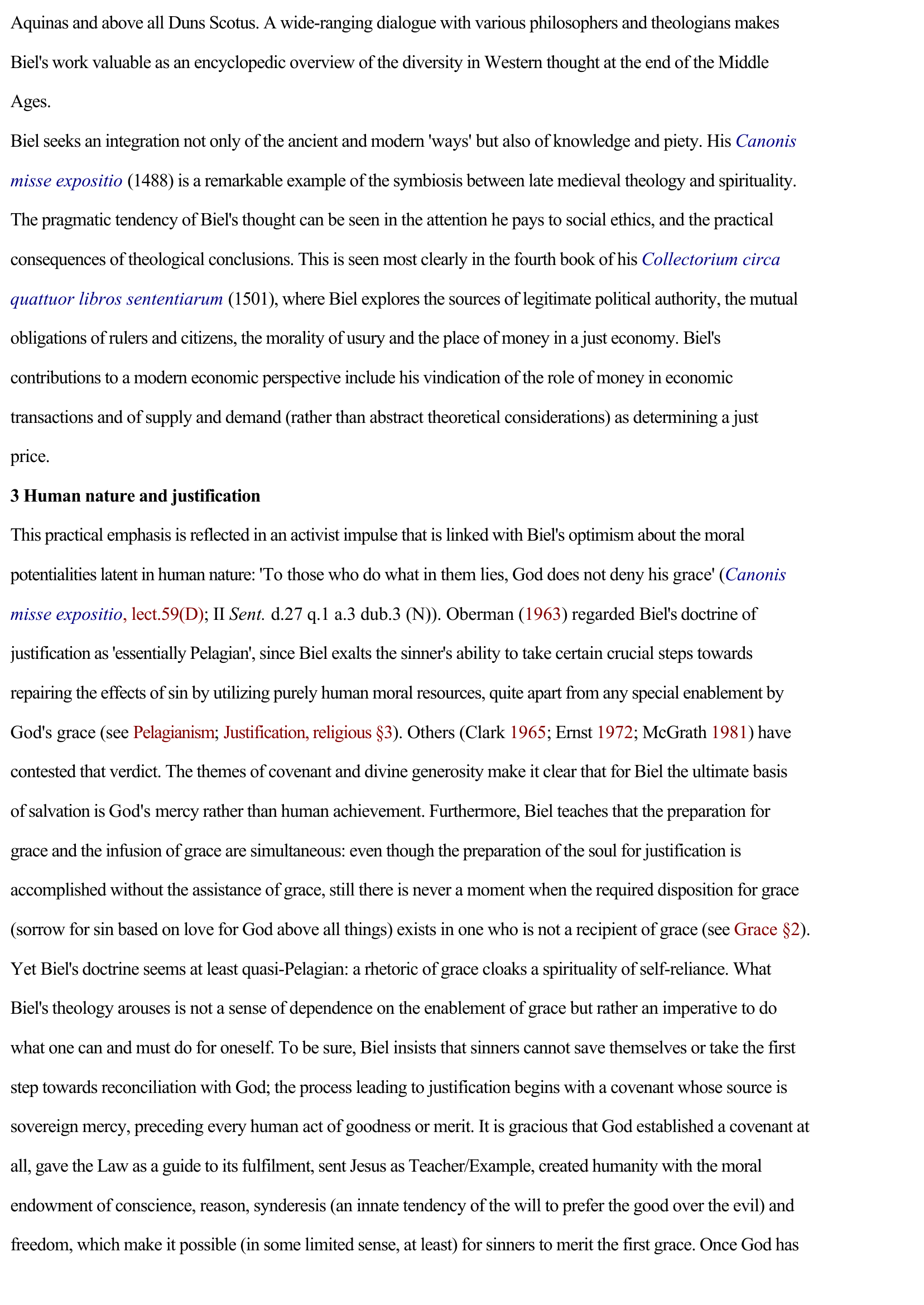Biel, Gabriel
Publié le 22/02/2012

Extrait du document
«
Aquinas and above all Duns Scotus.
A wide-ranging dialogue with various philosophers and theologians makes
Biel's work valuable as an encyclopedic overview of the diversity in Western thought at the end of the Middle
Ages.
Biel seeks an integration not only of the ancient and modern 'ways' but also of knowledge and piety.
His Canonis
misse expositio (1488) is a remarkable example of the symbiosis between late medieval theology and spirituality.
The pragmatic tendency of Biel's thought can be seen in the attention he pays to social ethics, and the practical
consequences of theological conclusions.
This is seen most clearly in the fourth book of his Collectorium circa
quattuor libros sententiarum (1501), where Biel explores the sources of legitimate political authority, the mutual
obligations of rulers and citizens, the morality of usury and the place of money in a just economy.
Biel's
contributions to a modern economic perspective include his vindication of the role of money in economic
transactions and of supply and demand (rather than abstract theoretical considerations) as determining a just
price.
3 Human nature and justification
This practical emphasis is reflected in an activist impulse that is linked with Biel's optimism about the moral
potentialities latent in human nature: 'To those who do what in them lies, God does not deny his grace' (Canonis
misse expositio , lect.59(D) ; II Sent.
d.27 q.1 a.3 dub.3 (N)).
Oberman ( 1963 ) regarded Biel's doctrine of
justification as 'essentially Pelagian' , since Biel exalts the sinner's ability to take certain crucial steps towards
repairing the effects of sin by utilizing purely human moral resources, quite apart from any special enablement by
God's grace (see Pelagianism ; Justification, religious §3 ).
Others (Clark 1965 ; Ernst 1972 ; McGrath 1981 ) have
contested that verdict.
The themes of covenant and divine generosity make it clear that for Biel the ultimate basis
of salvation is God's mercy rather than human achievement.
Furthermore, Biel teaches that the preparation for
grace and the infusion of grace are simultaneous: even though the preparation of the soul for justification is
accomplished without the assistance of grace, still there is never a moment when the required disposition for grace
(sorrow for sin based on love for God above all things) exists in one who is not a recipient of grace (see Grace §2 ).
Yet Biel's doctrine seems at least quasi-Pelagian: a rhetoric of grace cloaks a spirituality of self-reliance.
What
Biel's theology arouses is not a sense of dependence on the enablement of grace but rather an imperative to do
what one can and must do for oneself.
To be sure, Biel insists that sinners cannot save themselves or take the first
step towards reconciliation with God; the process leading to justification begins with a covenant whose source is
sovereign mercy, preceding every human act of goodness or merit.
It is gracious that God established a covenant at
all, gave the Law as a guide to its fulfilment, sent Jesus as Teacher/Example, created humanity with the moral
endowment of conscience, reason, synderesis (an innate tendency of the will to prefer the good over the evil) and
freedom, which make it possible (in some limited sense, at least) for sinners to merit the first grace.
Once God has.
»
↓↓↓ APERÇU DU DOCUMENT ↓↓↓
Liens utiles
- "Gabriel Péri" - plan de lecture linéaire
- gabriel peri
- ULYSSE ou l’intelligence. Gabriel Audisio (résumé)
- HOMME DE DIEU (Un). Gabriel Marcel
- ÉMIGRÉ (L') de Gabriel Sénac de Meilhan (résumé)

































